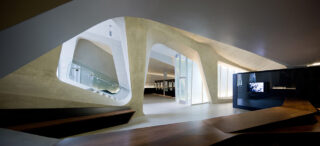This program is part of the Alignments in the Indigenous Design Process series, developed in collaboration with the Indigenous Society of Architecture, Planning and Design. Since time immemorial, Indigenous peoples were among the first architects of our built environment to design structures synchronized with nature and seasonal changes, aligned with the cosmos, and honoring our holistic relationship with a larger system. This series will present processes and projects with an array of alignments with natural and artificial elements that are woven into Indigenous spatial design methodologies.
The Mount Pleasant Indian Industrial Boarding School was a federal institution that operated from 1893 to 1934 on treaty lands of the Saginaw Chippewa Indian Tribe of Michigan. Between 2011 and 2013, part of the site was conveyed to the Tribe, along with seven historic school buildings. Over the past decade, community members have worked diligently to map out a new, hopeful future for a place that is marked by a complicated and tragic past. Slow Built Studio has worked pro bono for the Tribe for the past three years to develop a plan for a living memorial and new uses for the site, incorporating Anishinaabe cultural and material practices. This lecture will provide historical background and describe the community-based design work that has gone into the site’s planned transformation back into a space for indigenous life, art and language.
Speaker:
Christian Hart Nakarado, Assistant Professor of Art, Wesleyan University; Founder, Slow Built Studio
About the Speaker:
Christian is an Assistant Professor of Art at Wesleyan University and the founder of Slow Built Studio, a design, research, and architecture practice based in New Haven, Connecticut. His teaching and research both focus on impermanence in design and indigenous precedents for non-extractive making. He has spent 18 years working in practices on the east and west coasts of the United States, as well as in Canada and England. He is a licensed architect in New York, California, and Michigan, and is a member of the American Institute of Architects and the American Indian Council of Architects and Engineers. He is an enrolled member of the Sault Ste. Marie Tribe of Chippewa Indians.
This event is offered in person; COVID-19 vaccinations and face masks are strongly encouraged for all visitors. Read our full Health and Safety Protocol here.
Center for Architecture and ISAPD



